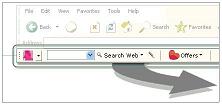
|
|
|
[Job Applications] [My CV] [Covering Letters] [[Interview Techniques] [Oral Presentations] [Psychometric Tests] Interview Techniques ::Being invited for interview means you have overcome the first hurdle. Your application was good enough to make it beyond the bin. However, there's a long way still to go! Before you goPreparation
is essential to performing well in an interview. You may or may
not be the world's best at selling yourself and thinking on your
feet, but good preparation will always help you. There are various
vital things you need to prepare before you go for an interview.
Know yourselfOf course
you took a copy of your application form or your covering letter!
This is the time to re-read what you wrote. Try to think about it
from the employer's point of view. What are your strong and your
weak points? What areas might need clarification? Is there anything
not on the form that you think they need to know?
Everything you put in your application is fair game for an interview question, so be prepared to expand on any of the information you have given. Know the jobRe-read the
job description. Talk to people doing the same type of job. List
the skills and qualities needed and think about the evidence you
can draw from your experience to demonstrate that you have them.
The more you can demonstrate that you know about the job, the more likely it is that the employer will believe you when you say you are well suited to it. Know the organisationFind out as
much as you can about the employer. Try the employer information
files in the Careers Service. If you can get the annual report,
read it. If there is a video, watch it. Companies often have mission/vision
statements or key principles: try to think of situations in your
own life which demonstrate those principles.
Keep your eyes on the news for any stories about the organisation or about their sector. Make a note of the facts and try to form opinions. Many organisations hold presentations. As well as being a useful source of information, these events can be an opportunity to meet some of the people whom you might be working with if you are successful. Know the detailsCheck the
time of the interview, the date, the location (it may not be at
the employer's offices) and the name and job title of the interviewer.
It is probably best to take the letter inviting you to interview
along with you. Have their phone number available in case anything
goes wrong.
Make sure you know how to get there and how long it will take. Make sure that you have the right clothes washed and ironed and that you've set the alarm clock! Try to get a good night's sleep. On the dayInterviewers
are not just concerned about what answers you give to their questions.
There are many factors which they will be taking into consideration,
from how you dress to how you cope with the killer question.
First impressionsAlways arrive
on time (preferably early - give yourself time to calm down, go
to the toilet, etc.). Dress appropriately (as if you already worked
for them). Watch your body language (firm handshakes, smile, make
eye-contact, be attentive, don't fidget). Remember, first impressions
matter.
Their questionsEmployers may ask you a variety
of questions, but in essence they only want to know three things,
and these are the questions you need to answer with evidence:
Your answers
Your questionsDon't ask
anything you should already know from the brochure, or about salary,
holidays, etc. Good topics to ask about are: training, career development,
working conditions, the organisation, what happens next, etc. If
they have answered all your questions, just say so.
AfterwardsWhat you do
What they doThey should
let you know how long it will be until you hear from them. Their
next communication (if it's not a rejection) could be a job offer
or an invitation to a second interview or assessment centre. Make
sure you know what to expect.
Types of questionAbout your application
About the job
About you
What ifs
General knowledge
Different interview situationsInterviews
can come at any stage in the selection process and can take many
forms. You may be interviewed on a one-to-one basis by a personnel
manager, someone from the relevant department, or even a psychologist.
You may face more than one interviewer. You may be interviewed at
the employer's premises, at your college, in a hotel, or possibly
over the telephone.
The important thing to remember is that the basic principles mentioned above apply to any situation. Panel interviewsInterview
panels of seven or more have been known. You can't talk to all of
them at once. Concentrate on giving your answer to the person who
asked you the question, but include the others with an occasional
glance.
Stress interviewsThe interviewer(s)
try to test how you react under pressure by firing rapid questions
at you, or being aggressive or offensive. This does not happen as
often as rumour would lead us to believe. Keep cool and try not
to take it personally.
Criterion-based interviewsSome recruiters
try to give every candidate the same chance by asking them all the
same questions. Whilst you must always answer the questions asked,
be ready to volunteer extra relevant information.
Telephone interviewsSome organisations
have started using these as a recruitment method. In some cases
you might have to undergo a telephone interview to check your qualifications
and experience before you can obtain an application form. A possible
development in the future could be interviews over a video-conferencing
link.
Further information
|
|
||||||||||
|
|||||||||||

